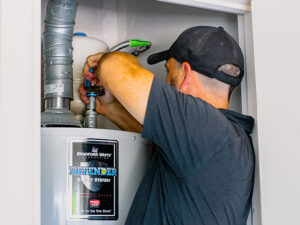Glass doors add a sleek look to homes and enhance spatial connectivity. They can also help reduce energy costs by allowing natural light to illuminate interior spaces.

They can be enhanced with smart locks, reinforced frames, and other security features without compromising their transparency. They can also be made more energy efficient by installing double-glazed glass. Visit https://glassgovernor.com/ to learn more.
When used in a room’s design, glass doors create the illusion of seamless transitions between areas. They can be an ideal solution for small spaces that need to feel bigger, and they can also enhance a sense of cohesion among rooms or between indoor and outdoor areas.
In addition to fostering connectivity, glass doors can also elevate an interior’s aesthetic appeal. Their sleek, transparent appearance adds a sophisticated sheen that is difficult to replicate with other door materials. The sheen of glass can also enhance the visual appeal of other elements, such as a textured stone feature wall or a plush area rug.
The transparency of glass doors allows natural light to permeate interiors, promoting a bright and inviting ambiance. This can help reduce reliance on artificial lighting and minimize energy consumption. In addition, the natural light can help boost mood and improve productivity.
These doors are designed to maximize natural light, reducing the need for artificial lighting and enhancing interior comfort. They are also customizable to suit a variety of aesthetic and functional requirements. The glass can be etched, frosted, or stained, and the hardware components can be customized to complement other features in the room. Moreover, the doors can be made from a wide range of frames and colors to suit different interior designs and tastes.
Like other architectural elements, glass doors require regular maintenance to preserve their beauty and functionality. They should be cleaned regularly using a non-abrasive cleaner to prevent scratching. In addition, lubricating the hinges and handles can help reduce squeaking and sticking. Periodic maintenance by qualified technicians can also help address any issues that may arise. This can include assessing the condition of the sealants and inspecting and tightening loose handles and locks.
They are highly customizable
A glass door can create a sense of openness in your home. It can also increase natural light, which can improve the mood in a room and reduce energy costs. Glass doors are available in a variety of styles, making it easy to customize them for your space. You can choose from a wide variety of options, including frosted glass, which provides privacy while reducing sun glare. In addition, you can choose doors that are sandblasted with different designs to suit your taste. These doors are highly customizable and can be as aesthetically pleasing as you want them to be.
In office environments, custom glass doors can make rooms feel more spacious by visually connecting spaces. They can help create distinction between rooms, but they will not provide the same level of privacy as solid doors. They will also allow more sunlight into the workspace, improving productivity and morale.
Many people are worried about the lack of privacy that comes with glass doors. While this is true, there are other ways to make a room feel more private without sacrificing transparency and space. For example, you can use curtains to block light and sound, or you can install a curtain track. You can also choose doors that are more insulated to keep out noise and heat.
The cost of interior glass doors can vary significantly depending on the type of door, its size, and the design. However, the overall cost is relatively low when compared to other types of doors. This is because a glass door can be easily cleaned and has no mechanical parts, which makes it a more affordable choice for homeowners.
They are energy efficient
Glass doors allow natural light to flood a room, brightening the space and reducing the need for artificial lighting during the day. This can also lower electricity bills and contribute to a more sustainable lifestyle.
Additionally, they can help regulate indoor temperatures during cold winters and hot summers, reducing the burden on HVAC systems. Double-pane glass doors are especially energy efficient, and many models feature argon gas filling, which inhibits heat loss. Some models even use krypton gas, which is considered to be an even more effective insulator.
They can be purchased in a variety of styles, sizes, and colors. They can even be customized with different frame materials, finishes, and decorative elements to create a unique look. This is an excellent option for homeowners looking to add a modern, upscale feel to their home or business.
Another benefit of glass doors is that they can be a great way to connect indoor and outdoor spaces. This is a growing trend in homes and offices, as people look for ways to improve the flow of their home and foster a sense of continuity. Glass doors provide a beautiful solution, allowing natural light to flow between rooms and into outdoor areas without obstructing visibility.
They can also be used to make a doorway more secure, as they are available with strong deadbolts and other security enhancements. This can reduce break-ins and theft, as well as improve the safety of children. In addition, frosted or tinted glass can be used to increase privacy while still letting in natural light. Additionally, smart locks are an excellent way to protect against burglary, allowing you to control who can enter your home remotely.
They are durable
Homeowners and business owners love the durability of glass doors. Unlike wood that can warp and become susceptible to termite infestation, glass is resistant to rot and corrosion. It also does not absorb dirt and dust. Glass is also easy to maintain. It can be cleaned with a cloth or a cleaner to remove unsightly smudges and stains.
They also provide abundant natural light, which is a major benefit for homeowners. This allows for better use of space and saves on energy costs by reducing the need for artificial lighting. In addition, natural light makes rooms look warmer and more inviting.
There are many types of glass for doors, including transparent, frosted, and translucent. The glass may also be tinted or etched to add privacy. They are also easy to clean and can be upgraded with various hardware, such as smart locks and hinges. They are also durable, with some being able to last for half a century or more.
Whether they are used in the kitchen, bathroom, or living room, glass doors can be customized to suit your interior design. They can be installed as sliding doors or as a hinged door, both of which offer a high level of flexibility and functionality. They can be made from a variety of materials, including wood and aluminum.
For homes with children, glass doors should be tempered to ensure safety. Untempered glass can break into sharp shards, and can injure or kill people if they fall against it. The risk of such an accident is high, especially for young children. In 1990, a Florida woman received compensation after her 7-year-old daughter ran into a non-tempered glass door.
They are easy to maintain
Glass doors are easy to maintain, but you need to wipe them regularly to prevent dirt, smudges, and fingerprints from building up. You can use a homemade cleaning solution of equal parts white vinegar and water, or you can purchase commercial cleaners to ensure your glass surfaces are sparkling clean. For stubborn stains, you can also try using mild dish soap or rubbing alcohol. Make sure to use a lint-free cloth when wiping the glass surfaces to avoid leaving streaks.
Glass interior doors can add a touch of luxury to your home or business. They are available in a variety of finishes and styles to complement your interior design. They can even be personalized with decorative elements like etchings, stained glass inserts, and custom designs. You can even get them with double-paned glass to improve energy efficiency.
One of the benefits of glass doors is that they allow natural light to enter your home, reducing your reliance on artificial lighting and lowering your energy bills. They are also great for regulating indoor temperature, allowing heat to escape in the winter and cooling air to escape in the summer. They can also be customized with frosted glass or tinted glass to provide privacy without sacrificing natural light.
Another benefit of glass interior doors is that they allow you to see who is at your door before you open it. This can help you increase your security measures and prevent unwanted visitors from entering your home or office. Moreover, the transparency of glass doors makes them easier to keep clean than traditional wood or metal frames. This is especially important for homes with young children.

